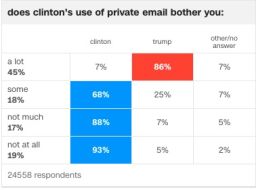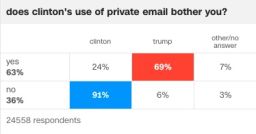Before we get to James Comey, fake Russian intelligence and the fact that it’s getting very hard to say the Russians didn’t affect the outcome of the election, let’s start this with the obvious caveat that there were a great many factors that led to Hillary Clinton’s loss to Donald Trump.
She had a clear advantage in pre-election polls, the better political resume, longer experience in government, a more clearly defined platform, the united backing of most of her party, years to plan an effective campaign, and the benefit of years of Democratic victories in the Democratic firewall of the Rust Belt.
But the Rust Belt turned on her and that political resume may actually have been a detriment. The polls in that area missed Trump’s surge. Her party was united, but not excited for her.
We could go on. And historians and political scientists are going to be scratching their heads about all this for generations.
Got it? The only reason Clinton lost is most certainly not that the Russians were meddling in the campaign. That’s an unassailable truth.
But – you could tell there was a big “but” coming, right?
The Russians were trying to influence the election. The US intelligence community has been unified on that point even as they have been unified in saying there is no way to “gauge” or say definitively whether Russian meddling influenced the result.
President Trump has clung to that key idea, repeating often that, as he told NBC’s Lester Holt, “The Russians did not affect the vote.”
But a report from the Washington Post Wednesday that a memo with “dubious” information suggesting collusion between the Clinton campaign and the Justice Department to quash the investigation into Clinton’s use of a private email server during her time as secretary of state was part of what led Comey to go rogue on the matter.
New reporting Friday from CNN’s Dana Bash, Shimon Prokupecz and Gloria Borger that Comey knew the intelligence was fake but still he told Congress it drove his decision – he went around his bosses at the Justice Department to announce publicly there wasn’t evidence there to charge Clinton with the crime of mishandling classified information, but that she was reckless and careless with state secrets – makes it more difficult still.
Here’s an argument explaining how the Russians’ fake memo works its way to influencing American politics:
The Washington Post report suggests it was the flawed memo with “faked” by Russians that led Comey to announce in July of 2016 that there was not enough evidence to bring charges against Clinton or her staffers for their treatment of classified information during her time as secretary of state.
The fake information was apparently within a Russian intelligence document obtained by the FBI. It was supposed to describe – and remember this is now believed to be disinformation – an email between then-DNC chair Debbie Wasserman Schultz and the leader of a group funded by Democratic mega-donor George Soros in which she expressed an understanding that the Justice Department would slow-walk its investigation into Clinton’s email.
Repeating again, just for clarity, that there doesn’t appear to have ever been a Wasserman Schultz email.
“I never saw the e-mail and didn’t author it,” Wasserman Schultz told CNN’s Erin Burnett Wednesday night, asked about the email described in the Russian memo.
The other important element is that Bill Clinton met with Attorney General Loretta Lynch on a plane in Phoenix in late June, which compounded the seed planted by the Russian memo.
The horrendous optics created by the former president meeting with the attorney general and the knowledge that the fake intelligence existed are what combined to spur Comey forward. He was worried, apparently, that if the memo leaked, it would further conspiracy theories.
So he went public not with the whole truth, but a sort of political chess move to protect his agency.
The thing is – and this is largely of her own doing for having the email server in the first place – it’s pretty clear that email is part of what brought Hillary Clinton down.
The exit polling is clear: 63% of voters said Clinton’s use of private email bothered them. That’s a big majority. Forty-five percent of voters said it bothered them “a lot.”


Now add to those concerns the fact that Trump had a variety of scandals. Clinton had one. And it dominated. In part thanks to Comey and his July announcement and October Surprise on the same subject, were the single dominant story about Clinton.
A recent academic study of polling suggests the email questions dominated all the news about Clinton in the final days of the election and further suggests it did a lot to hurt her. She was unable to shake the scandal and ineffective in explaining why she had the server in the first place. Comey’s actions, witting or not, compounded those problems.
Clinton herself has said it was Comey’s decisions, particularly the one in October, that interrupted her momentum and cost her the election.
As we’ve noted above, it’s certainly not the case that this was the sole factor in her defeat. There’s a lot more to it.
There are many caveats to insert here about the Russian memo, Comey’s actions, etc.
But if it is true that a fake Russian intelligence memo, led Comey to act the way he did – and if the academic study and polling suggest that those actions kept her emails in the news – and if those actions hurt her public standing, then how is it possible to still say that there’s no way to say if Russian meddling had any impact on the outcome?
Before he was fired by Trump, Comey said the Russian attempts to influence US elections continue and that they may have learned an important lesson from their 2016 efforts.
“I think one of the lessons that the Russians may have drawn from this is: this works,” Comey said.




















